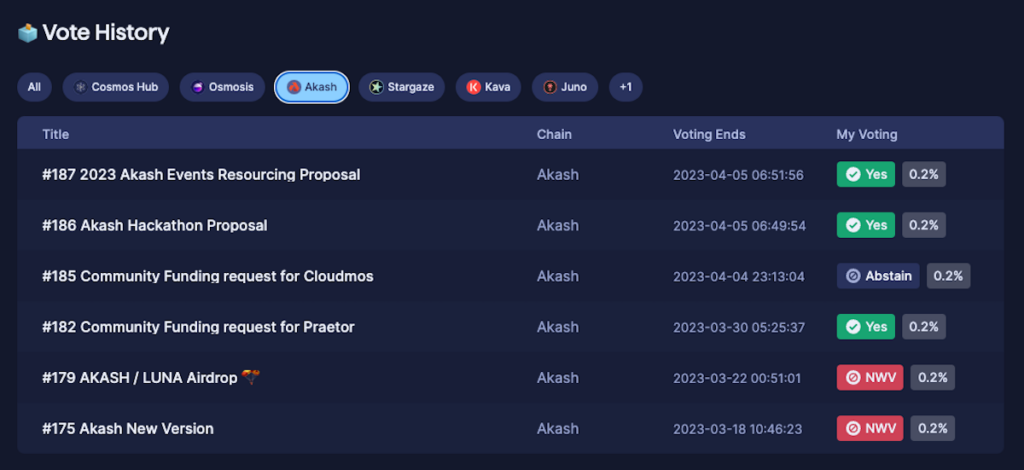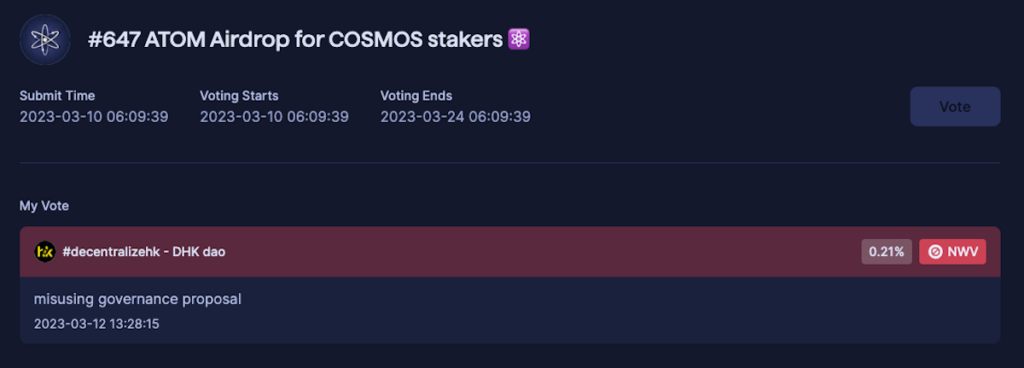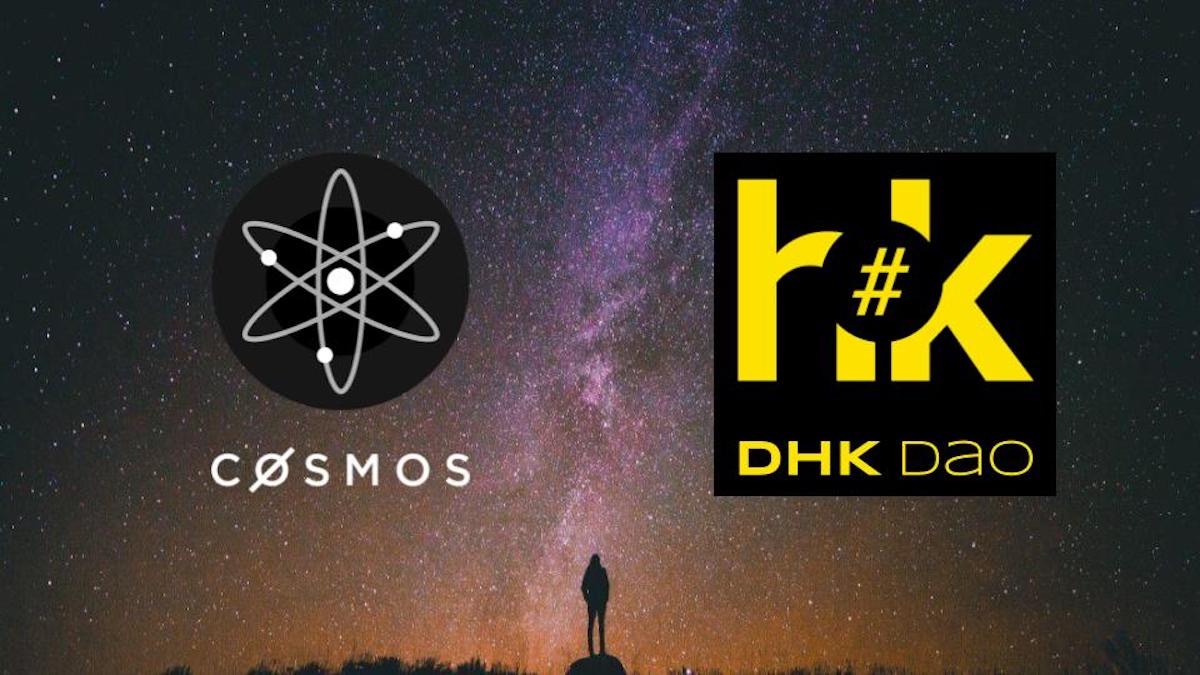Established in 2020, DHK dao later became a validator for several chains in the Cosmos ecosystem, playing a role similar to that of a “legislative councilor” and participating in governance of the blockchain world.
Councilors who never vote
Although I compare validators to councilors, to be honest, many validators just set up and maintain servers and never participate in governance. However, this doesn’t mean that the comparison is not appropriate. After all, there are councilors who only hold a title, don’t need to run for elections or attend meetings, and when called upon, they vote in favor of the government. Not only are there no consequences, but they may even be re-elected in the next term.
Taking Cosmos Hub as an example, the three huge centralized exchanges among the leading validators, Coinbase, Binance, and Kraken, have never voted in proposals or participated in discussions, and instead of “punishing them with their votes”, users are still staking their assets with these inactive big brands. On the contrary, DHK dao has a relatively small scale of staked assets, and therefore its proportional voting power is tiny, but it values the rights and obligations of “blockchain citizens” more than most validators. After all, the first sentence of the DHK dao declaration is “Building Consensus among 7mil people.” Practicing democracy is DHK dao’s original intention.
However, although the vision is clear, the field of blockchain governance is still very new, and the industry is only exploring how to practice democracy, adapting and adjusting as they go along. Below, I will use March 2023 as an example to introduce DHK dao’s daily work and decision-making process in community governance, further increasing transparency, and allowing you to understand more in the hope that you will participate and express your opinions.
Lazy Consensus: Agree by not objecting
Currently, DHK dao serves as a validator for ten chains: Cosmos Hub, Osmosis, Juno, Evmos, Akash, Kava, Stargaze, Desmos, Chihuahua and Comdex. Readers holding corresponding currencies are welcome to stake their idle assets with us. DHK dao’s commission on each chain is 5%, with most being the lowest commission allowed by the system.
If a blockchain is likened to a “country,” then DHK dao is working as a “parliament member” for ten countries simultaneously. Excluding proposals that did not receive enough deposit to proceed to a vote, a total of 76 proposals were processed across the ten federated chains in the past month. If the highest standard is used, understanding the background of all proposals, participating in some discussions, and occasionally soliciting opinions within the dao would be quite a heavy workload. This is especially true when DHK dao used to validate over twenty chains during peak times, and just reviewing proposals was overwhelming.
I used to be solely responsible for the review work, and I have written about the three most controversial proposals: Juno Proposal #16 for confiscating whale assets, Cosmos Hub Proposal #69 for introducing the CosmWasm virtual machine, and Cosmos Hub Proposal #82 for upgrading to ATOM 2.0. Starting from 2023, the work of reviewing proposals for DHK dao is shared by two other community members, leafwind and Astro Hsu, along with myself, each taking turns to be responsible for one month. This not only lightens my burden but also allows for more discussion and collective wisdom.
The “lazy consensus” advocated by point four of DHK dao Declaration is also applied to the voting decision-making process for DHK dao as a validator on various chains. The person in charge generally will not solicit community opinions before voting but will timelily post relevant proposals and voting intentions in Discord, allowing stakeholders to express their opinions. Only when stakeholders hold different views will the community engage in discussion and, if necessary, change voting intentions; otherwise, the person in charge’s opinion will be followed. Validators deal with a large number of proposals, and apart from Cosmos Hub, the voting period for other chains is only a few days. Lazy consensus is DHK dao’s bold attempt to balance democracy and efficiency.
Last month’s proposal review was supposed to be handled by Astro Hsu, but it coincided with his wedding, so I took over. Out of the 76 proposals, I voted on 59, meaning I missed 17. Among them, I got a bit distracted after returning to Hong Kong in the middle of the month and missed 10 of Osmosis’s 26 proposals. The other 7 were all Comdex proposals, which I accidentally missed due to the 48-hour voting period and a misunderstanding caused by the new voting tool. In any case, I am solely responsible for missing the 17 proposals, and I apologize.

Making of: Proposal Review Process
The most basic action in governance is tracking proposals. In the Cosmos ecosystem, this used to involve subscribing to numerous Discords, Twitters, etc., which was quite tiring.
Fortunately, Keplr Wallet launched a validator voting platform earlier, which simplifies tracking proposals across multiple chains in a one-stop manner. If you don’t consider the preliminary discussions and incubation in forums, you can basically not miss any proposal by checking the voting platform every two or three days. However, since three of the chains validated by DHK dao are not yet supported by Keplr, their proposals still need to be tracked separately. I started using the voting platform in March and didn’t realize that Comdex chain was not included until almost the end of the month, missing most of the proposals.
Another amazing feature of the Keplr voting platform is that it allows validators to authorize specific wallets to vote on their behalf. The private key of a validator administrator has always been crucial, fearing leaks and operational errors, and it is not suitable for multiple people to hold. However, this also means that any operation requires the administrator’s private key, such as requesting the administrator to vote after I make a judgment on a proposal, which is time-consuming. In response to this, Cosmos SDK has added the authz module, allowing administrators to authorize other wallets to perform specific commands on their behalf, distributing the work. The Keplr voting platform uses authz to enable validators to authorize specific wallets to vote, so I no longer need to request administrators to help with each proposal.
Moreover, the Keplr voting platform has a thoughtful design, allowing voters to briefly explain their voting intentions. This not only helps stakeholders grasp the delegates’ ideas but also provides validators with an opportunity to explain the principles behind their voting directions, laying a solid foundation for the entire Cosmos governance ecosystem.
The feature for validators to explain their voting rationale is especially important when their voting intentions diverge from the mainstream opinions. For example, proposals to shorten the voting period and raise the deposit requirements for proposals have appeared several times in various chains, with the majority of the community supporting them, but I usually vote “No” against the tide. My physical world lacks democracy, which makes me cherish the right to propose and vote more than validators in Western countries and South Korea. Although shortening the voting period can improve efficiency and raising the deposit requirement can reduce spam proposals, I would rather sacrifice some efficiency to protect the rights of citizens on the blockchain. In the past, I have cast “against the world” votes, and it wasn’t until last month that I could add a footnote to “exonerate” myself while voting, allowing the community to understand that my opposition is not destructive but rather a serious pursuit of democracy.

P.S. I originally organized a full list of the content and DHK dao’s voting directions for all 76 proposals last month at the end of the article, but it turned out to be very lengthy, so I gave up. If you are interested in learning more, please visit dhk.org/blog or read the DHK dao monthly report issued on Mondays in the middle of each month.
Extended reading
- How is “Common Prosperity” cultivated? Juno Proposal 16 Casebook
- Democracy’s Trial: A Wake-up Call from Juno Proposal 16
- The most controversial proposal in the entire “cosmos” – Cosmos Hub #69
- The usefulness of the useless is the greatest use – my ideal Cosmos
- ATOM 2.0 White Paper Rejected: The Best Teaching Material for Blockchain Governance
- Lazy Consensus + Contrarian Voting: Collaboration of the Silent Majority
- DHK dao: Decentralized Autonomous Organizations Enter the Public Sphere
My articles are not put behind a paywall and are all open for reading. If you like this article, please collect its Writing NFT to support writing and preserve journalism.


Leave a Reply